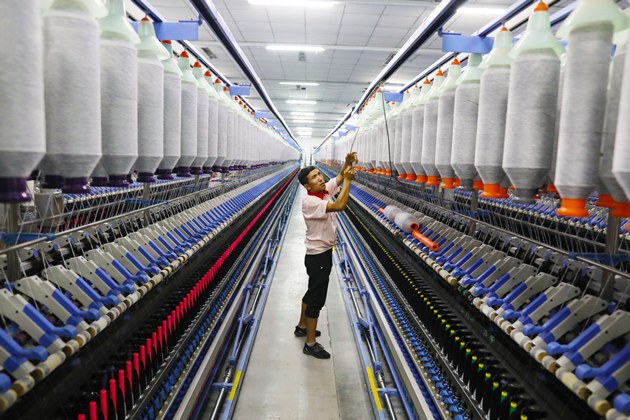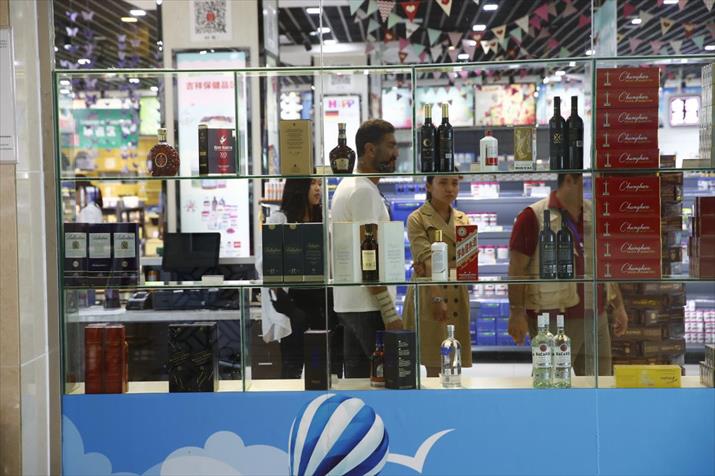|
||||||||||
| Home Nation World Business Opinion Lifestyle ChinAfrica Multimedia Columnists Documents Special Reports |
|
||||||||||
| Home Nation World Business Opinion Lifestyle ChinAfrica Multimedia Columnists Documents Special Reports |
| Current Cover Story |
| Open Door Policy |
| Inland Horgos City becomes a magnet for investment thanks to its highly attractive policies |
| By Li Xiaoyu | VOL. 9 July 2017 ·2017-06-30 |

One of those businesspeople who took advantage of these attractions in the seemingly remote location of Horgos in northwest China's Xinjiang Uygur Autonomous Region is Min Jianbo, CEO of Boshihao Electronics, a manufacturer of industrial robots. The company relocated its production lines from the economic powerhouse city of Shenzhen in south China's Guangdong Province to Horgos, which is more than 600 km west of Urumqi, capital of the autonomous region. Apparently, Min is satisfied with the result.
"Horgos changes every second. We are confident that the city will become another Shenzhen of the future," he told ChinAfrica. And he is hardly alone in that view.
According to local government statistics, up to March 2017, more than 6,000 enterprises have been registered in Horgos, established as a city in 2014, 10 times more than five years before. The city has been building on the momentum created by the Belt and Road Initiative to up its game as an international trade platform, which explains the surge in businesses relocating.
Besides being the location of the China-Kazakhstan Horgos International Border Cooperation Center (cross-border free trade zone), Horgos is also a special economic zone and as the city's list of special statuses grows, local businesses enjoy more and more preferential policies.
Significant advantages
At first, the proposal to relocate to Horgos was far from welcome among senior officials of Boshihao, recalls Min. "In their eyes, Xinjiang was too remote and unfamiliar." He added that there were question marks raised about Xinjiang's landlocked isolation.
"The Belt and Road Initiative made us think again about the special geostrategic position of Xinjiang," Min told ChinAfrica. His manufacturing facilities now employ nearly 200 locals, half of whom are Uygurs, Kazaks and other ethnic minorities.
In fact, located in northwest part of China and bordering eight countries, Xinjiang acts as a gate in China's opening up policy. According to Min, his company has much to gain from this geostrategic advantage.
"Horgos lies at the heart of the infrastructure network linking China with countries along the Silk Road Economic Belt. By moving here, we can serve our customers more efficiently," he said, adding that his company exports 70 percent of its production abroad. In fact, while Russia remains its main market, Boshihao's new location in Horgos will allow it to further reach Central Asian and Middle Eastern markets, he said.

In addition, the newly-opened rail freight route between China and Europe transits through Horgos, which is another factor behind Min's decision. "Because of this train, my company is now more competitive, as we can deliver more quickly."
Previously, products had to be transported by sea for 90 days before reaching their end market. With the railway, goods can now be shipped from Horgos to Russia in just two weeks. "Reducing delivery time will accelerate our cash flow and significantly reduce pressures on our self-financing capacity," Min said.
Preferential policies
But this is not the only reason that prompted Boshihao to resettle in Horgos. "By coming here, our company benefits from a five-year income tax exemption and an additional five-year tax break. This is obviously a big help for us," said Min.
According to the Horgos Municipal Office of State Administration of Taxation, the amount of tax exemption and reduction for businesses registered in Horgos amounted to 3.2 billion yuan ($470 million) in 2016 alone.
Entrepreneurs of big companies like Min are not the only ones to benefit. Many small traders also find a place to thrive in the city. Pan Chunyan is one of them. The clothing trader from east China's Zhejiang Province is currently operating a 2,000-square-meter duty-free shop in the cooperation center.
"There are so many customers, we don't even need to advertise," she told ChinAfrica. In fact, every day, tens of thousands of people visit her shop, whose daily turnover is nearly 8,000 yuan ($1,200).
Most of her clients are Central Asian merchants who once found it inconvenient to trade in China because of visa restrictions, she explains. Now, they can enter the cooperation center by simply showing their passports. "It makes things a lot easier," she added.
Today, the cooperation center is already showing excellent results, as confirmed by official figures. Since its establishment in 2012, the annual number of visitors had increased from 320,000 to 5 million in 2016.
Efficiency as a norm
Moreover, the efficiency of the local administration came as a pleasant surprise to Min. "I can complete my registration in the local companies' registry in about 10 minutes."
According to Guo Jianbin, Deputy Director of Management Committee of Horgos Economic Development Zone, the city has invested 70 million yuan ($10.3 million) to set up a new administrative service center and to meet the growing demands.
Yu Chengzhong, CEO of Jinyi International Trade, another trading company in Horgos, has been equally impressed. Every day, nearly 50 trucks from Kazakhstan and other countries load tons of fruits and vegetables from its warehouses, such as apples and peaches.
"Now, fruits loaded in Horgos in the morning can land on consumers' tables in Kazakhstan for dinner," Yu said. "This was unthinkable a few years ago."
Indeed, it often took several days to clear products through customs in the past. Many fruits and vegetables were spoiled as a result. Today, customs declarations can be completed online and inspection is done directly at the company's warehouses, which shortens the process.
As he witnesses the new city change day by day, Min is upbeat about the future. "The Belt and Road Initiative is like our helmsman, and our company is a sailor who follows his direction, against wind and tide," he said.
| About Us | Contact Us | Advertise with Us | Subscribe |
| Copyright Beijing Review All rights reserved 京ICP备08005356号-5 京公网安备110102005860号 |